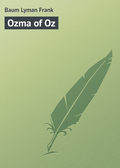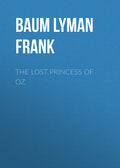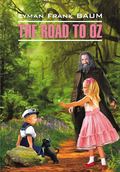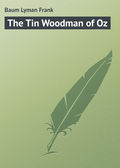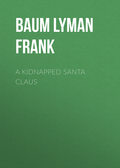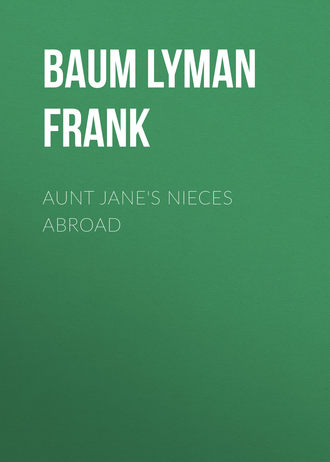
Лаймен Фрэнк Баум
Aunt Jane's Nieces Abroad
CHAPTER IX
COUNT FERRALTI
At dinner it was announced that the famous Tarantella would be danced in the lower hall of the hotel at nine o'clock, and the girls told Uncle John that they must not miss this famous sight, which is one of the most unique in Sorrento, or indeed in all Italy.
As they entered the pretty, circular hall devoted to the dance Louise gave a start of surprise. A goodly audience had already assembled in the room, and among them the girl seemed to recognize an acquaintance, for after a brief hesitation she advanced and placed her hand in that of a gentleman who had risen on her entrance and hastened toward her.
He was a nice looking young fellow, Beth thought, and had a foreign and quite distinguished air.
Presently Louise turned with cheeks somewhat flushed and brought the gentleman to her party, introducing him to Uncle John and her cousins as Count Ferralti, whom she had once met in New York while he was on a visit to America.
The Count twirled his small and slender moustaches in a way that Patsy thought affected, and said in excellent English:
"It delights me to meet Mr. Merrick and the young ladies. May I express a hope that you are pleased with my beautiful country?"
"Are you Italian?" asked Uncle John, regarding the young man critically.
"Surely, Mr. Merrick. But I have resided much in New York, and may well claim to be an adopted son of your great city."
"New York adopts a good many," said Uncle John, drily. "It has even been thoughtless enough to adopt me."
The dancers entered at that moment and the Americans were forced to seat themselves hastily so as not to obstruct the view of others. Count Ferralti found a place beside Louise, but seemed to have little to say to her during the course of the entertainment.
The dances were unique and graceful, being executed by a troup of laughing peasants dressed in native costume, who seemed very proud of their accomplishment and anxious to please the throng of tourists present. The Tarantella originated in Ischia, but Sorrento and Capri have the best dancers.
Afterward Uncle John and his nieces stood upon the terrace and watched the volcano rolling its dense clouds, mingled with sparks of red-hot scoria, toward the sky. The Count clung to Louise's side, but also tried to make himself agreeable to her cousins. In their rooms that night Patsy told Beth that the young foreigner was "too highfalutin' to suit her," and Beth replied that his manners were so like those of their Cousin Louise that the two ought to get along nicely together.
Uncle John liked his nieces to make friends, and encouraged young men generally to meet them; but there was something in the appearance of this callow Italian nobleman that stamped his character as artificial and insincere. He resolved to find out something about his antecedents before he permitted the young fellow to establish friendly relations with his girls.
Next morning after breakfast he wandered through the lobby and paused at the little office, where he discovered that the proprietor of this hotel was a brother of that Floriano who managed the Hotel du Vesuve. That gave him an excuse to talk with the man, who spoke very good English and was exceedingly courteous to his guests – especially when they were American.
"I see you have Count Ferralti with you," remarked Uncle John.
"Whom, sir?"
"Ferralti – Count Ferralti. The young man standing by the window, yonder."
"I – I did not know," he said, hesitatingly. "The gentleman arrived last evening, and I had not yet learned his name. Let me see," he turned to his list of guests, who register by card and not in a book, and continued: "Ah, yes; he has given his name as Ferralti, but added no title. A count, did you say?"
"Yes," replied Uncle John.
The proprietor looked curiously toward the young man, whose back only was visible. Then he remarked that the eruption of Vesuvius was waning and the trouble nearly over for this time.
"Are the Ferraltis a good family?" asked Uncle John, abruptly.
"That I cannot tell you, Signor Merrick."
"Oh. Perhaps you know little about the nobility of your country."
"I! I know little of the nobility!" answered Floriano, indignantly. "My dear signor, there is no man better posted as to our nobility in all Italy."
"Yet you say you don't know the Ferralti family."
The proprietor reached for a book that lay above his desk.
"Observe, signor. Here is our record of nobility. It is the same as the 'Blue Book' or the 'Peerage' of England. Either fortunately or unfortunately – I cannot say – you have no need of such a book in America."
He turned the pages and ran his finger down the line of "Fs."
"Find me, if you can, a Count Ferralti in the list."
Uncle John looked. He put on his glasses and looked again. The name of Ferralti was no place in the record.
"Then there is no such count, Signor Floriano."
"And no such noble family, Signor Merrick."
Uncle John whistled softly and walked away to the window. The young man greeted him with a smile and a bow.
"I misunderstood your name last evening," he said. "I thought you were Count Ferralti."
"And that is right, sir," was the prompt reply. "Allow me to offer you my card."
Uncle John took the card and read:
"CONTE LEONARDI FERRALTI,Milano, Italia."
He carefully placed the card in his pocket-book.
"Thank you," said he. "It's a fine morning, Count."
"Charming, Mr. Merrick."
Uncle John walked away. He was glad that he had not suspected the young man unjustly. When an imposture is unmasked it is no longer dangerous.
He joined his nieces, who were all busily engaged in writing letters home, and remarked, casually:
"You've been deceived in your Italian friend, Louise. He is neither a count nor of noble family, although I suppose when you met him in New York he had an object in posing as a titled aristocrat."
The girl paused, examining the point of her pen thoughtfully.
"Are you sure, Uncle John?"
"Quite sure, my dear. I've just been through the list of Italian counts, and his name is not there. Floriano, the proprietor, who knows every aristocrat in Italy, has never before heard of him."
"How singular!" exclaimed Louise. "I wonder why he has tried to deceive us."
"Oh, the world is full of impostors; but when you are on to their game they are quite harmless. Of course we won't encourage this young man in any way. It will be better to avoid him."
"He – he seems very nice and gentlemanly," said Louise with hesitation.
The other girls exchanged glances, but made no remark. Uncle John hardly knew what to say further. He felt he was in an awkward position, for Louise was the most experienced in worldly ways of his three nieces and he had no desire to pose as a stern guardian or to deprive his girls of any passing pleasure they might enjoy. Moreover, Louise being in love with that young Weldon her mother so strongly objected to, she would not be likely to care much for this Italian fellow, and Mrs. Merrick had enjoined him to keep her daughter's mind from dwelling on her "entanglement."
"Oh, well, my dear," he said to her, "you must act as you see fit. I do not imagine we shall see much of this young man, in any event, and now that you are well aware of the fact that he is sailing under false colors, you will know how to handle him better than I can advise you."
"I shall be very careful," said Louise slowly, as she resumed her writing.
"Well then, girls, what do you say to a stroll around the village?" asked their uncle. "I'm told it's a proper place to buy silk stockings and inlaid wood-work. They come assorted, I suppose."
Beth and Patsy jumped up with alacrity, but Louise pleaded that she had several more letters to write; so the others left her and passed the rest of the forenoon in rummaging among the quaint shops of Sorrento, staring at the statue of Tasso, and enjoying the street scenes so vividly opposed to those of America. It was almost their first glimpse of foreign manners and customs. In Naples they had as yet seen nothing but darkness and falling ashes.
CHAPTER X
THE ROAD TO AMALFI
The Hotel Victoria faces the bay of Naples. Back of it are the famous gardens, and as you emerge from these you find yourself upon the narrow main street of Sorrento, not far from the Square of Tasso.
As our little party entered this street they were immediately espied by the vetturini, or cabmen, who rushed toward them with loud cries while they waved their whips frantically to attract attention. One tall fellow was dressed in a most imposing uniform of blue and gold, with a high hat bearing a cockade a la Inglese and shiny top boots. His long legs enabled him to outstrip the others, and in an almost breathless voice he begged Uncle John to choose his carriage: "the besta carrozza ina town!"
"We don't want to ride," was the answer.
The cabman implored. Certainly they must make the Amalfi drive, or to Massa Lubrense or Saint' Agata or at least Il Deserto! The others stood by to listen silently to the discussion, yielding first place to the victor in the race.
Uncle John was obdurate.
"All we want to-day is to see the town," he declared, "We're not going to ride, but walk."
"Ah, but the Amalfi road, signore! Surely you will see that."
"To-morrow, perhaps; not now."
"To-morrow, signore! It is good. At what hour, to-morrow, illustrissimo?"
"Oh, don't bother me."
"We may as well drive to Amalfi to-morrow," suggested Beth. "It is the proper thing to do, Uncle."
"All right; we'll go, then."
"You take my carrozza, signore?" begged the cabman. "It is besta ina town."
"Let us see it."
Instantly the crowd scampered back to the square, followed more leisurely by Uncle John and the girls. There the uniformed vetturio stood beside the one modern carriage in the group. It was new; it was glossy; it had beautiful, carefully brushed cushions; it was drawn by a pair of splendid looking horses.
"Is not bellissima, signore?" asked the man, proudly.
"All right," announced Uncle John, nodding approval. "Be ready to start at nine o'clock to-morrow morning."
The man promised, whereat his confreres lost all interest in the matter and the strangers were allowed to proceed without further interruption.
They found out all about the Amalfi drive that evening, and were glad indeed they had decided to go. Even Louise was pleased at the arrangement and as eager as the others to make the trip. It is one of the most famous drives in the world, along a road built upon the rocky cliff that overhangs the sea and continually winds in and out as it follows the outlines of the crags.
They had an early breakfast and were ready at nine o'clock; but when they came to the gate of the garden they found only a dilapidated carriage standing before it.
"Do you know where my rig is?" Uncle John asked the driver, at the same time peering up and down the road.
"It is me, sir signore. I am engage by you. Is it not so?"
Mr. Merrick looked at the driver carefully. It was long-legs, sure enough, but shorn of his beautiful regalia.
"Where's your uniform?" he asked.
"Ah, I have leave it home. The road is dusty, very; I must not ruin a nice dress when I work," answered the man, smiling unabashed.
"But the carriage. What has become of the fine carriage and the good horses, sir?"
"Ah, it is dreadful; it is horrible, signore. I find me the carrozza is not easy; it is not perfect; it do not remain good for a long ride. So I leave him home, for I am kind. I do not wish the signorini bella to tire and weep. But see the fine vetture you now have! Is he not easy like feathers, an' strong, an' molto buena?"
"It may be a bird, but it don't look it," said Uncle John, doubtfully. "I rented the best looking rig in town, and you bring me the worst."
"Only try, signore! Others may look; it is only you who must ride. You will be much please when we return."
"Well, I suppose we may as well take it," said the little man, in a resigned tone. "Hop in, my dears."
They entered the crazy looking vehicle and found the seats ample and comfortable despite the appearance of dilapidation everywhere prevalent. The driver mounted the box, cracked his whip, and the lean nags ambled away at a fair pace.
They passed near to the square, where the first thing that attracted Uncle John's attention was the beautiful turnout he had hired yesterday. It was standing just as it had before, and beside it was another man dressed in the splendid uniform his driver had claimed that he had left at home.
"Here – stop! Stop, I say!" he yelled at the man, angrily. But the fellow seemed suddenly deaf, and paid no heed. He cracked his whip and rattled away through the streets without a glance behind him. The girls laughed and Uncle John stopped waving his arms and settled into his seat with a groan.
"We've been swindled, my dears," he said; "swindled most beautifully. But I suppose we may as well make the best of it."
"Better," agreed Patsy. "This rig is all right, Uncle. It may not be as pretty as the other, but I expect that one is only kept to make engagements with. When it comes to actual use, we don't get it."
"That's true enough," he returned. "But I'll get even with this rascal before I've done with him, never fear."
It was a cold, raw morning, but the portiere at the Victoria had told them the sun would be out presently and the day become more genial. Indeed, the sun did come out, but only to give a discouraged look at the landscape and retire again. During this one day in which they rode to Amalfi and back, Uncle John afterward declared that they experienced seven different kinds of weather. They had sunshine, rain, hail, snow and a tornado; and then rain again and more sunshine. "Sunny Italy" seemed a misnomer that day, as indeed it does many days in winter and spring, when the climate is little better than that prevailing in the eastern and central portions of the United States. And perhaps one suffers more in Italy than in America, owing to the general lack of means to keep warm on cold days. The Italian, shivering and blue, will tell you it is not cold at all, for he will permit no reproach to lie on his beloved land; but the traveller frequently becomes discouraged, and the American contingent, especially, blames those misleading English writers who, finding relief from their own bleak island in Italian climes, exaggerated the conditions by apostrophizing the country as "Sunny Italy" and for more than a century uttered such rhapsodies in its praise that the whole world credited them – until it acquired personal experience of the matter.
Italy is beautiful; it is charming and delightful; but seldom is this true in winter or early spring.
The horses went along at a spanking pace that was astonishing. They passed through the picturesque lanes of Sorrento, climbed the further slope, and brought the carriage to the other side of the peninsula, where the girls obtained their first view of the Gulf of Salerno, with the lovely Isles of the Sirens lying just beneath them.
And now they were on the great road that skirts the coast as far as Salerno, and has no duplicate in all the known world. For it is cut from the solid rock of precipitous cliffs rising straight from the sea, which the highway overhangs at an average height of five hundred feet, the traveller being protected only by a low stone parapet from the vast gulf that yawns beneath. And on the other side of the road the cliffs continue to ascend a like distance toward the sky, their irregular surfaces dotted with wonderful houses that cling to the slopes, and vineyards that look as though they might slip down at any moment upon the heads of timorous pilgrims.
When it rained they put up the carriage top, which afforded but partial shelter. The shower was brief, but was shortly followed by hail as big as peas, which threatened to dash in the frail roof of their carrozza. While they shrank huddled beneath the blankets, the sun came out suddenly, and the driver shed his leathern apron, cracked his whip, and began singing merrily as the vehicle rolled over the smooth road.
Our travellers breathed again, and prepared to enjoy once more the wonderful vistas that were unfolded at every turn of the winding way. Sometimes they skirted a little cove where, hundreds of feet below, the fishermen sat before their tiny huts busily mending their nets. From that distance the boats drawn upon the sheltered beach seemed like mere toys. Then they would span a chasm on a narrow stone bridge, or plunge through an arch dividing the solid mountain. But ever the road returned in a brief space to the edge of the sea-cliff, and everywhere it was solid as the hills themselves, and seemingly as secure.
They had just sighted the ancient town of Positano and were circling a gigantic point of rock, when the great adventure of the day overtook them. Without warning the wind came whistling around them in a great gale, which speedily increased in fury until it drove the blinded horses reeling against the low parapet and pushed upon the carriage as if determined to dash it over the precipice.
As it collided against the stone wall the vehicle tipped dangerously, hurling the driver from his seat to dive headforemost into the space beneath. But the man clung to the reins desperately, and they arrested his fall, leaving him dangling at the end of them while the maddened horses, jerked at the bits by the weight of the man, reared and plunged as if they would in any instant tumble themselves and the carriage over the cliff.
At this critical moment a mounted horseman, who unobserved had been following the party, dashed to their rescue. The rider caught the plunging steeds by their heads and tried to restrain their terror, at his own eminent peril, while the carriage lay wedged against the wall and the driver screamed pitifully from his dangerous position midway between sea and sky.
Then Beth slipped from her seat to the flat top of the parapet, stepped boldly to where the reins were pulling upon the terrified horses, and seized them in her strong grasp.
"Hold fast," she called calmly to the driver, and began dragging him upward, inch by inch.
He understood instantly the task she had undertaken, and in a moment his courage returned and he managed to get his foot in a crack of the rock and assist her by relieving her of part of his weight. Just above was a slight ledge; he could reach it now; and then she had him by the arm, so that another instant found him clinging to the parapet and drawing himself into a position of safety.
The wind had died away as suddenly as it came upon them. The horses, as soon as the strain upon their bits was relaxed, were easily quieted. Before those in the carriage had quite realized what had occurred the adventure was accomplished, the peril was past, and all was well again.
Uncle John leaped from the carriage, followed by Louise and Patsy. The young horseman who had come to their assistance so opportunely was none other than Count Ferralti, whom they had such good reason to distrust. He was sitting upon his horse and staring with amazement at Beth, at whose feet the driver was grovelling while tears flowed down his bronzed cheeks and he protested in an absurd mixture of English and Italian, by every saint in the calendar, that the girl had saved him from a frightful death and he would devote his future life to her service.
"It is wonderful!" murmured Ferralti. "However could such a slip of a girl do so great a deed?"
"Why, it's nothing at all," returned Beth, flushing; "we're trained to do such things in the gymnasium at Cloverton, and I'm much stronger than I appear to be."
"'Twas her head, mostly," said Patsy, giving her cousin an admiring hug; "she kept her wits while the rest of us were scared to death."
Uncle John had been observing the Count. One of the young man's hands hung limp and helpless.
"Are you hurt, sir?" he asked.
Ferralti smiled, and his eyes rested upon Louise.
"A little, perhaps, Mr. Merrick; but it is unimportant. The horses were frantic at the time and wrenched my wrist viciously as I tried to hold them. I felt something snap; a small bone, perhaps. But I am sure it is nothing of moment."
"We'd better get back to Sorrento," said Uncle John, abruptly.
"Not on my account, I beg of you," returned Ferralti, quickly. "We are half way to Amalfi now, and you may as well go on. For my part, if the wrist troubles me, I will see a surgeon at Amalfi – that is, if you permit me to accompany you."
He said this with a defferent bow and a glance of inquiry.
Uncle John could not well refuse. The young fellow might be a sham count, but the manliness and courage he had displayed in their grave emergency surely entitled him to their grateful consideration.
"You are quite welcome to join us," said Uncle John.
The driver had by now repaired a broken strap and found his equippage otherwise uninjured.
The horses stood meekly quiescent, as if they had never known a moment's fear in their lives. So the girls and their uncle climbed into the vehicle again and the driver mounted the box and cracked his whip with his usual vigor.
The wind had subsided as suddenly as it had arisen, and as they passed through Positano – which is four hundred feet high, the houses all up and down the side of a cliff like swallows' nests – big flakes of snow were gently falling around them.
Count Ferralti rode at the side of the carriage but did not attempt much conversation. His lips were tight set and the girls, slyly observing his face, were sure his wrist was hurting him much more than he cared to acknowledge.
Circling around the cliff beyond Positano the sun greeted them, shining from out a blue sky, and they wondered what had become of the bad weather they had so lately experienced.
From now on, past Prajano and into Amalfi, the day was brilliant and the temperature delightful. It was full noon by the time they alighted at the little gate-house of the ancient Cappuccini-Convento, now a hotel much favored by the tourist. Count Ferralti promised to join them later and rode on to the town to find a surgeon to look after his injured hand, while the others slowly mounted the long inclines leading in a zigzag fashion up to the old monastery, which was founded in the year 1212.
From the arbored veranda of this charming retreat is obtained one of the finest views in Europe, and while the girls sat enjoying it Uncle John arranged with a pleasant faced woman (who had once lived in America) for their luncheon.
An hour later, and just as they were sitting down to the meal, Count Ferralti rejoined them. His hand was bandaged and supported by a sling, and in answer to Louise's gentle inquiries he said, simply:
"It was as I had feared: a small bone snapped. But my surgeon is skillful, and says time will mend the wrist as good as new."
In spite of his courage he could eat no luncheon, but merely sipped a glass of wine; so Uncle John, alarmed at his pallor, insisted that he take a seat in the carriage on the return journey. Beth wanted to ride the Count's horse home, but there was no side saddle to be had, so they led the animal by a halter fastened behind the ricketty carriage, and Beth mounted the box and rode beside her friend the driver.
The pleasant weather lasted until they neared Sorrento, when another shower of rain came up. They reached their hotel damp and bedraggled, but enthusiastic over their wonderful trip and the interesting adventure it had incidentally developed.



